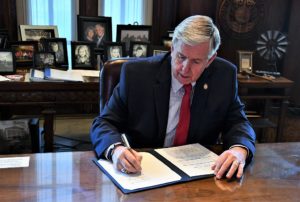“Christian Values” Statement Has No Place in Our Government
 Missouri Gov. Mike Parson in 2020 (Image via Office of Missouri Governor)
Missouri Gov. Mike Parson in 2020 (Image via Office of Missouri Governor) “[Donald Kauerauf] is outspokenly pro-life and morally opposed to abortion. Missourians know that I share these beliefs and would not have nominated someone who does not share the same Christian values.”
The above statement, made earlier this month by Missouri Governor Mike Parson, quickly prompted criticism and concern for the separation of religion and government. The statement was used to announce the resignation of Donald Kauerauf as director of the Missouri Department of Health and Senior Services, who was basically ousted by the Missouri Senate.
Many questioned the statement, wondering if Parson was implying that he wouldn’t even consider nominating someone who wasn’t Christian. Parson’s team quickly walked back the statement, with a representative emphasizing that Parson has no “litmus test for appointments.” Although Parson does have a history of appointees of various religious backgrounds, the statement still drew criticism, and understandably so.
The governor’s remarks, even if he’s not implying that being Christian is a prerequisite, are still offensive and exclusionary. It implies that his identity as a Christian is an important part of his role as a government leader and that he favors “Christian values” in his appointees. With this declaration, how are we to trust that he will actually treat nominees equally regardless of faith?
In response to the statement, the Interfaith Partnership of Greater St. Louis expressed concern in an open letter to Parson. It was signed by multiple organizations, including the Ethical Society of St. Louis, an affiliate of the AHA, led by James Croft.
Regarding the Ethical Society of St. Louis’ participation in the letter, Croft said,
As Leader of the Ethical Society of St. Louis, a large and thriving community of Humanists in St. Louis, MO, I was shocked to hear Gov. Parson declare that he would only appoint officials who shared his “Christian values.” While I am glad the Governor offered a swift clarification of his statement, his office seemed not to understand the reason behind the concern of many non-Christian groups in Missouri.
Any signal that non-Christians are unwelcome in public office compounds the sense of outsidership and marginalization that many already feel. Humanists, atheists, and the nonreligious are criminally underrepresented in US politics at the state and national levels, including in Missouri. Furthermore, in the last few years, our state has weathered countless attempts to enshrine Christian values and beliefs in law, including attempts to require public schools to teach the Bible–and only the Bible–to their students.
In a climate so frequently hostile to those of minority faiths and those of no faith, Gov. Parson’s words were ill-chosen and unfortunate. The Ethical Society of St. Louis hopes he will work to rebuild relationships with the non-Christian communities of this state which were harmed by his choice of words.
This isn’t the first time that a government leader has endorsed religion and the role it plays in their decisions, and it definitely won’t be the last. In November of last year, former Trump national security advisor Michael Flynn urged the United States to “embrace one religion” (which, of course, would be Christianity). When Rick Santorum ran for president in 2012, he declared “our civil laws have to comport with a higher law: God’s law,” essentially implying that, if elected, his religious beliefs would impact American law. When Gov. Greg Abbott signed Texas’ extreme anti-abortion legislation last year, he explained his rationale as, “our creator endowed us with the right to life, and yet millions of children lose their right to life every year because of abortion.”
Around the country, governmental leaders are shamelessly making decisions based upon their religious beliefs, without much thought about the citizens harmed or excluded.
We won’t be able to achieve true religious freedom and democracy for all without true separation of religion and government. We understand that some government leaders, like Parson, have found meaning through faith. But letting that specific faith influence the actions and decisions of said leaders is harmful because it doesn’t accurately reflect the diversity of the American population.
Statements like Parson’s remind us how important it is for us to continue to fight for the separation of church and state in all of our institutions and to make our voices heard.
